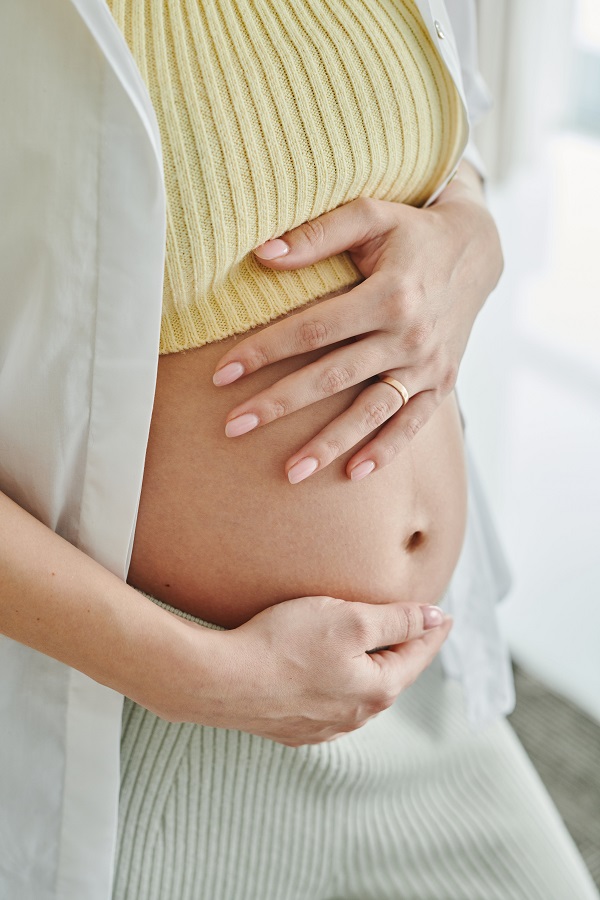Last Updated on January 1, 2025
When a mother cries during pregnancy, it can trigger stress hormones which may potentially affect the baby’s development and emotional well-being. Pregnancy is a time of emotional and physical changes for both the mother and the developing baby.
When a mother experiences distress and sheds tears, it can cause a surge in stress hormones such as cortisol. Research suggests that high levels of stress hormones during pregnancy can have an impact on the baby’s brain development and behavior.
Additionally, a mother’s emotional state can affect the baby’s emotional regulation and stress response later in life. Expectant mothers need to prioritize self-care and seek support to mitigate the impact of stress on both their well-being and their baby’s development.
Effects Of Mother’s Emotional State On Pregnancy

Pregnancy is a beautiful journey that brings joy and anticipation to the life of a mother. However, it is also a time when a woman experiences a myriad of emotions, both positive and negative. The emotional well-being of a mother plays a crucial role in the development of her unborn baby.
Read More – When To Use Mother’s Milk Tea?
Impact Of Mother’s Crying On Hormonal Balance
When a mother cries during pregnancy, it triggers a cascade of hormonal changes that can potentially affect both her and the baby. These hormonal changes can disrupt the delicate balance required for a healthy pregnancy.
Psychological Effects On The Mother
The act of crying itself can have psychological effects on the mother. It is often associated with feelings of sadness, helplessness, or frustration. These emotions can impact the mother’s mental well-being and lead to increased stress and anxiety levels.
Chronic stress during pregnancy can be harmful and may increase the risk of certain complications such as preterm birth or low birth weight. Expectant mothers need to find healthy ways to manage and cope with their emotions to minimize these risks.
Possible Effects On The Developing Baby
Crying during pregnancy can potentially affect the developing baby. It is believed that excessive stress or emotions experienced by the mother can result in hormonal imbalances that may impact the baby’s development and overall health.
The emotional state of a mother during pregnancy can have a profound impact on the developing baby. When a mother cries during pregnancy, it can potentially affect the emotional and physical well-being of the fetus. The possible effects of a mother’s tears on the developing baby are worth exploring, particularly concerning the influence of hormonal changes and the developmental effects on the fetus.
Read More – What Are The Benefits Of Mother’s Milk Tea?
Influence of Hormonal Changes on the Baby
During pregnancy, a mother’s emotional state can trigger the release of stress hormones such as cortisol. These hormones can cross the placenta and reach the developing baby, potentially affecting the baby’s stress response system. Elevated levels of stress hormones in the womb can influence the baby’s developing brain and nervous system, potentially leading to long-term impact on the baby’s stress regulation and emotional well-being.
Developmental Effects on the Fetus
Studies suggest that a mother’s stress or depression during pregnancy may impact fetal development. This can result in potential consequences such as decreased fetal movement, preterm birth, low birth weight, and altered neurodevelopmental outcomes. Expectant mothers must seek support and manage their emotional well-being during pregnancy to mitigate potential developmental effects on the baby.
The emotional state of a mother during pregnancy can have significant effects on the developing baby, both in terms of hormonal influences and developmental outcomes. Expectant mothers need to prioritize their emotional well-being and seek support to ensure a healthy pregnancy for both themselves and their babies.
The Role Of Stress And Anxiety
During pregnancy, it is crucial to prioritize the emotional well-being of the mother. The role of stress and anxiety during this time cannot be overlooked, as it can impact both the mother and the developing baby.
Connection Between Maternal Stress And Emotional Well-being
Maternal stress and emotional well-being are closely interconnected during pregnancy. High levels of stress can lead to anxiety, depression, and an imbalanced emotional state, affecting the overall well-being of the mother.
Emotional support from loved ones, practicing relaxation techniques, and seeking professional help can help alleviate maternal stress and promote a healthier emotional state.
Impact Of Maternal Anxiety On The Baby
Maternal anxiety during pregnancy can have a profound impact on the developing baby. Research suggests that high levels of maternal anxiety may increase the risk of preterm birth, low birth weight, and developmental issues in the baby.
Bonding activities, such as talking or singing to the baby, can help reduce maternal anxiety and promote a positive environment for the baby’s development.
Read More – Can You Travel With Breast Milk Without Baby?
Ways To Cope With Emotional Distress
During pregnancy, when a mother experiences emotional distress and cries, it can have an impact on both her and the baby. The mother needs to find healthy ways to cope with these emotions, such as seeking support from loved ones, practicing self-care, and engaging in relaxation techniques.
Seeking Support From Healthcare Providers
During pregnancy, expectant mothers need to seek support from healthcare providers when experiencing emotional distress. Regular check-ups with doctors or midwives can provide a safe space to express concerns, ask questions, and discuss any emotional challenges you may be facing. Healthcare providers are trained to offer advice and support during this time, ensuring that you and your baby receive the necessary care. They can guide you on coping mechanisms, recommend appropriate therapies, or refer you to mental health professionals if needed.
Engaging In Relaxation Techniques
Engaging in relaxation techniques can be incredibly beneficial when coping with emotional distress during pregnancy. These techniques can help calm the mind, reduce anxiety, and promote a sense of well-being. Here are a few relaxation techniques you can try:
- Deep Breathing Exercises: Take slow, deep breaths in through your nose and exhale slowly through your mouth. Focus on your breath as it fills your lungs, and allow yourself to relax with each exhale.
- Meditation: Find a quiet place where you can sit comfortably and focus on your breathing or a peaceful image. Allow your mind to be present in the moment and let go of any negative thoughts or worries.
- Yoga: Practicing prenatal yoga can help alleviate stress and promote relaxation. It combines gentle stretches, breathing exercises, and mindfulness, allowing you to connect with your body and baby.
- Guided Imagery: Close your eyes and imagine yourself in a calm, tranquil place. Visualize all the details of this place and let yourself feel the peace and serenity wash over you.
- Progressive Muscle Relaxation: Start by tensing and then relaxing each muscle group in your body, one at a time. This systematic approach helps release tension and promotes overall relaxation.
Remember, it’s essential to prioritize self-care during pregnancy. Taking the time to engage in relaxation techniques can have a positive impact on your emotional well-being, which in turn benefits both you and your baby.
The Importance Of Mental Health During Pregnancy

Pregnancy is a crucial time for mental health. When a mother cries, it can impact her well-being and the baby’s development. Seeking support and addressing emotions is vital to ensure a healthy and positive pregnancy experience. Prioritizing mental health can also lead to better overall prenatal care.
Promoting Emotional Well-being For Mothers
Taking care of your mental health during pregnancy is just as important as taking care of your physical health. Pregnancy is a period of immense emotional and physical changes, and it is completely normal for mothers-to-be to experience a wide range of emotions. However, when a mother cries during pregnancy, it can be a sign of underlying emotional distress that should not be ignored.
As an expectant mother, it is essential to prioritize your emotional well-being. Here are some strategies to help you foster emotional well-being during pregnancy:
- Seek support: Talk to your partner, friends, or family members about how you are feeling. Sharing your emotions with a trusted support system can provide relief and reassurance.
- Practice self-care: Take time out for yourself and engage in activities that you enjoy. Whether it’s taking a relaxing bath, reading a book, or going for a walk, self-care activities can help alleviate stress and promote emotional well-being.
- Stay active: Engaging in regular physical activity can help release endorphins, which are natural mood enhancers. Consider gentle exercises like prenatal yoga or swimming to keep your body and mind in a positive state.
- Try relaxation techniques: Deep breathing exercises, meditation, and mindfulness can help calm your mind and reduce anxiety. These techniques can be easily incorporated into your daily routine.
- Join a support group: Connecting with other expectant mothers who are going through similar experiences can provide a sense of belonging and understanding. Joining a support group or participating in prenatal classes can be beneficial for your emotional well-being.
Creating A Supportive Environment For Expectant Mothers
In addition to promoting your emotional well-being, it is crucial to have a supportive environment around you during pregnancy. Here are some ways to create that environment:
- Open communication: Communicate your feelings and needs to your loved ones and healthcare providers. Being open about your emotions can help them understand and support you better.
- Encourage positive relationships: Surround yourself with individuals who uplift and support you. Avoid negative influences and prioritize healthy, positive relationships during this emotionally vulnerable time.
- Involve your partner: Share your emotions with your partner and involve them in your pregnancy journey. Their understanding and support can make a significant difference in maintaining your emotional well-being.
- Education and knowledge: Equip yourself with information about pregnancy and mental health. Learning about the changes you may experience and seeking professional guidance can help you navigate the emotional challenges more effectively.
- Healthcare provider support: Discuss your emotional well-being with your healthcare provider. They can provide appropriate resources and support to ensure your mental health needs are addressed throughout your pregnancy.
Remember, emotional well-being during pregnancy is crucial for both you and your baby. By prioritizing your mental health and creating a supportive environment, you are taking important steps toward a healthy and positive pregnancy journey.
Frequently Asked Questions For What Happens When Mother Cries During Pregnancy?
Can A Mother’s Crying Affect The Baby During Pregnancy?
Yes, a mother’s excessive crying during pregnancy can have emotional and physiological effects on the developing baby.
How Does A Mother’s Stress Impact The Unborn Baby?
When a mother experiences high levels of stress, it can increase the risk of premature birth and affect the baby’s brain development.
What Are The Potential Consequences Of A Mother’s Emotional Distress On The Baby?
Emotional distress during pregnancy can lead to behavioral problems, anxiety, and even an increased risk of developing psychological disorders later in life.
Can A Mother’s Sadness Affect The Baby’s Long-term Emotional Well-being?
Yes, a mother’s sadness can impact the baby’s long-term emotional well-being and increase their vulnerability to mental health issues.
How Can A Pregnant Woman Manage Her Emotions To Protect Her Baby’s Well-being?
By seeking support, practicing relaxation techniques, engaging in stress-reducing activities, and maintaining a healthy lifestyle, a pregnant woman can manage her emotions for the well-being of her baby.
Conclusion
The emotional state of a mother during pregnancy can deeply impact both her and her baby’s well-being. When a mother cries, it can be a sign of overwhelming emotions and stress, which can potentially affect the developing fetus. Expectant mothers must prioritize their mental health and seek support when needed.
By addressing emotional needs during pregnancy, mothers can create a nurturing environment for their unborn child and promote a healthier pregnancy journey overall.

